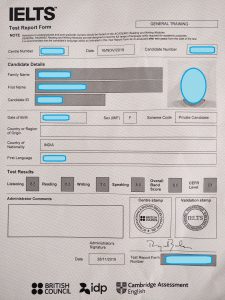Below are tips from a successful IELTS candidate for getting band 8 overall. For the purpose of anonymity I have called her Annie.
Annie’s Result
- Listening = 8.5
- Reading = 8.5
- Writing = 7.5
- Speaking = 8
Computer or Paper Test Tips
Choosing the test format (Paper/Computer) wisely: I was weak in listening and no matter what I couldn’t score beyond 7.5 in my practice tests. While I was taking my practice tests on computer, I realised that I had no opportunity to highlight the text or make notes for reference. It was the same case with reading. My writing and typing speed were relatively same. So, I opted for paper based test and it was the best decision as evident from my listening and reading scores. Although I lost quite a lot of time in editing my essay on paper and I feel I could have scored band 8 through typing, listening and reading were my priorities.
Listening Tips
Like Liz and other tutors reiterate, answers often appear as synonyms. Learning alternative ways in which the same thing is expressed and practicing to identify the synonymous language is extremely helpful. If you’re unable to do so while listening, note down the words used and come back to it while answering. It happened to me twice or thrice and the notes helped me. The key is to stay with the audio and not get lost if you miss something. Recheck the word fit into the answer sentence before you finalize the answer. This eliminates undesired mistakes in tenses, singular and plural, spelling etc.
Reading Tips
Patience is the key. It’s important to develop stamina to sustain your focus required to complete all sections. Keyword search is the most effective way of targetted reading covering only required parts. When I felt stuck, I chose to answer easy questions first and the quick wins kept me going. Especially in ‘True, False, Not Given’ type, the strategy that aids decision making is crucial. For example, a statement is false if there’s a clear contradiction, a statement should be marked as ‘Not Given’ if relevant information is totally absent. The last two passages are actually informative, sometimes fun to read. If you look at passages with an intention to make sense out of the content instead of just answering, you can connect the dots and derive the answers with much more ease.
Writing Tips
The biggest mistake I made is to change my stance mid-way. After I wrote the first paragraph, I felt I was able to get adequate points on the other side of motion. I lost time in erasing and re-writing. Even if it means spending good amount of time, identify your stance clearly so you’ll spend rest of the time strengthening your content. We’ll never be able to practice all possible essay questions or preempt our topics, but we can always carry a skeletal structure around which the essay could be developed. Needless to say, an essay with good range of vocabulary is a definite winner. That said, do not force fit words. Throw in a few words to make your essay look smart and that’s just about it.
Speaking Tips
I was quite confident about the speaking test. In fact, I did well in first two parts. Part three was a shocker and I struggled to express my views about the topic. What you need to remember while answering is that you’re not judged based on your choices. You may either like or dislike something and the idea is to express what you feel with clarity in thought. This acknowledgment then made me more comfortable and eased me during the rest of the conversation.
That is all from my end. Annie.
Message to Annie: Thank you so much for sharing your tips. I know many people will benefit from them and be inspired by your results 🙂 Liz.
More IELTS Candidate Tips
Click below to read more tips from successful IELTS candidates:
How I scored Band 9 in Speaking
How I scored Band 9 in Reading
…………………….
Subscribe for Free for New Posts Delivered by Email






